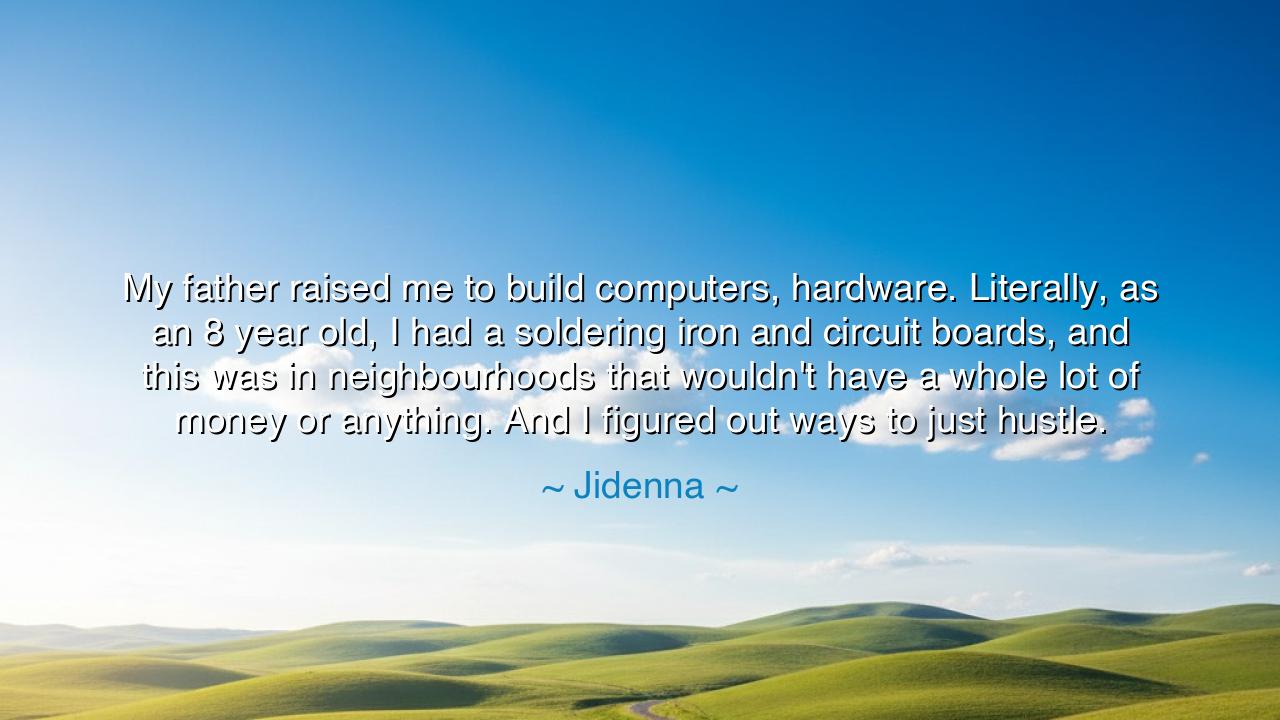
My father raised me to build computers, hardware. Literally, as
My father raised me to build computers, hardware. Literally, as an 8 year old, I had a soldering iron and circuit boards, and this was in neighbourhoods that wouldn't have a whole lot of money or anything. And I figured out ways to just hustle.






In the heartfelt and fiery words of Jidenna, artist, innovator, and son of both tradition and technology, we hear a story of creation, discipline, and survival: “My father raised me to build computers, hardware. Literally, as an 8-year-old, I had a soldering iron and circuit boards, and this was in neighbourhoods that wouldn’t have a whole lot of money or anything. And I figured out ways to just hustle.” These words, though simple in form, carry within them the pulse of an ancient truth — that greatness is not inherited, but forged; that even in poverty, wisdom can be wealth; and that the hands which build, when guided by purpose, can reshape destiny itself.
Jidenna’s story begins not in the comfort of privilege, but in the humble crucible of limitation. His father, a man of vision, did not give him toys of silver or lessons of leisure. He gave him tools — a soldering iron, circuit boards, the raw materials of creation — and in doing so, he handed his son not comfort, but capacity. It was a lesson drawn from the ancient way, when fathers taught sons the crafts of survival and mastery. As the blacksmith’s child learned to shape iron, and the farmer’s child learned to sow the earth, so did Jidenna learn to shape the future from wires and circuits. His father, like the wise elders of old, understood that to teach a child to build is to grant him dominion over circumstance.
In the world he describes — neighbourhoods without wealth — knowledge becomes not an ornament, but a weapon. The soldering iron in Jidenna’s hand was more than a tool of trade; it was the modern equivalent of the ancient spear, the symbol of self-reliance. While others may have seen scarcity, he saw possibility. He learned, as all great builders do, to hustle — not merely to sell or to survive, but to create value where none seemed to exist. This is the essence of the maker’s spirit: to look upon the chaos of the world and, through patience and will, bring forth order and purpose.
His story calls to mind the legend of Benjamin Banneker, the African-American astronomer and inventor who, born in the 18th century to a family of former slaves, taught himself mathematics and built a striking wooden clock that kept perfect time for decades. Like Jidenna, Banneker had no wealth but was rich in curiosity; no power but that of his own hands and mind. From scraps and study, he rose to become one of the most brilliant scientific minds of his age. Both men, separated by centuries, share the same inheritance — the belief that knowledge and persistence can transcend all boundaries of poverty, race, or circumstance.
Yet there is something even deeper in Jidenna’s reflection — a reverence for fatherhood, and the transmission of strength through teaching. In every age, the wise have said that true legacy is not measured in land or gold, but in the skills and virtues passed from one generation to the next. His father gave him not just an education in circuits and current, but a philosophy of living: “Do not wait for opportunity. Build it.” This is the creed of the self-made, the unyielding, the ones who carry their light through the dark. His father’s lesson was not only technical; it was spiritual. For to create is divine, and to hustle — to persist through struggle — is to keep faith with one’s own potential.
In his words, we also hear the pulse of the immigrant’s dream — of those who come from far lands and hard beginnings, believing that with enough knowledge, one can alter the course of fate. Jidenna’s upbringing in such a world shaped him into both artist and engineer, bridging the gap between culture and craft, poetry and precision. He learned that genius is not born from luxury, but from necessity; that the fire of innovation burns brightest in the cold of scarcity. Like the ancient inventors who crafted wonders out of dust and bronze, he learned that creation itself is a form of resistance — a way to rise beyond limitation.
The lesson, then, is clear and timeless: your circumstances do not define you — your craft does. Whether you are born among riches or among rusted streets, you possess the power to build, to learn, to create. Let your hands, your mind, your hunger for knowledge be your inheritance. Seek mentors who, like Jidenna’s father, give you tools, not excuses. Do not wait for the world to offer comfort; instead, forge your future with the iron of discipline and the electricity of imagination.
So, children of tomorrow, remember Jidenna’s story: when the world gives you little, build much. When the markets deny you access, invent your own. The soldering iron in your hands may seem small, but it holds the power of creation — the same power that raised civilizations from dust. For those who learn to build, even the humblest circuit can become a crown. And in the rhythm of your labor, in the persistence of your craft, you too shall find greatness — not given, but made.






AAdministratorAdministrator
Welcome, honored guests. Please leave a comment, we will respond soon